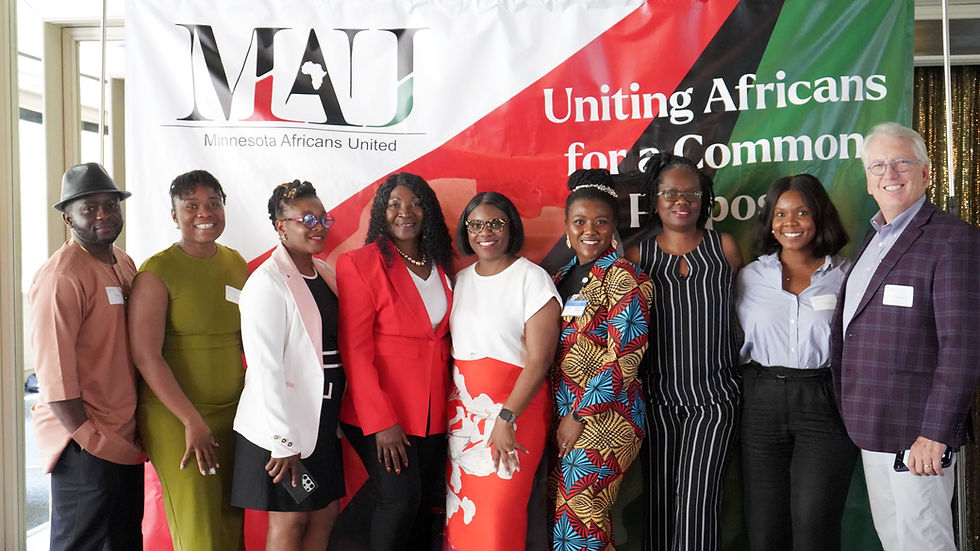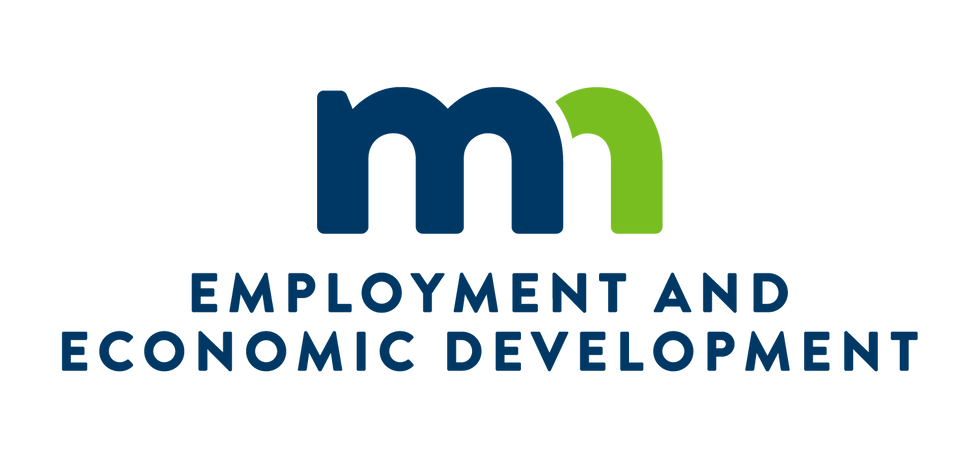Summit creates dialogue on navigating international trade, investment, and export opportunities for Minnesota-based businesses
- Stevie Kloeber
- Aug 21
- 5 min read
Updated: Aug 27
August 2025

On August 1, 2025, Minnesota Africans United (MAU) hosted the 2025 U.S.-Africa Trade and Investment Summit at The Commodore in St. Paul, Minnesota. This event brought together expert voices familiar with navigating international trade to provide insight and guidance on how to increase export opportunities for Minnesota-based businesses. In attendance were leaders representing a broad spectrum of industries throughout the metro area, including healthcare, solar energy, agriculture, international law, commerce, and international development.
While trade policy and negotiations under the current administration continue to evolve, the mood at the summit was one of optimism, recognizing that the U.S.-Africa trade relationship is under exploited and there is ample opportunity to focus on collaboration and development of partnerships to strengthen two-way trade between the United States and African nations. Minnesota is positioned to be a leader in this space by tapping into the connections of its underutilized large African diaspora community. In fact, according to Professor Carlisle Ford Runge, Professor of Applied Economics & Law, University of Minnesota, state policy for Minnesota is quite friendly for international trade.
Minnesota ready to strengthen business ties with African diaspora community and African nations
To kick off the summit, MAU was honored to welcome Commissioner Matt Varilek of the Minnesota Department of Employment and Economic Development (DEED) who gave a keynote address during a VIP Networking Breakfast. During his speech, Commissioner Varilek spoke of the opportunity to not only increase trade between Minnesota and Africa but to also support the business development of Minnesota’s rich African diaspora community. “If you think about Africa as a continent, it is one of the youngest continents in terms of population,” Commissioner Varilek said. “At a time where internationally, demographics are changing and most countries are getting older, in Africa we have young, growing, dynamic, innovative, entrepreneurial folks, many of whom are choosing to be here in Minnesota and we are so proud of that.”


Commissioner Varilek noted his observation of how the business community in Minnesota comes together to solve global problems and exports those solutions elsewhere. And the benefits of trade go in both directions. Commissioner Varilek estimates over $200 million in trade between Minnesota and the African continent. A number he believes shows that there is a lot of room for growth.
This is one of the many reasons that DEED is eager to continue partnering with MAU to fill gaps in business development resources for rising entrepreneurs and innovators. These programs boost economic growth in Minnesota, creating numerous jobs, and forging essential partnerships that can lead to increasing global relations and trade opportunities between the U.S. and Africa.
Jeremy Faber, Senior Advisor of Trade, Investment and Foreign Affairs, MAU, pointed out that despite the unknown of how trade policy will continue to evolve, one thing to keep in mind is that the U.S. Embassy apparatus is still operating and the administration’s priorities is to double down on the number of commercial opportunities. This means that ambassadors have certain key performance indicators when it comes to international business transactions. So while government negotiations may still be taking place, there are opportunities for Minnesota-based businesses interested in international markets to make an impact.
Hidden barriers of trade
There are many challenges to international trade that can create hurdles for exporting American products that are not always related to government negotiated trade agreements. At times what stands in the way of American export is not policy, but rather regulatory requirements for commodities that might not be met, creating hidden barriers for export contracts. John O’Connell, an International Trade and Technical consultant explained with the example that Kenya has a 100% ban on GMOs so while there is a 2 million metric ton feed deficit that USDA would like to fill by exporting animal feed ingredients, this ban creates challenges for U.S.-grown corn and other products to meet the requirements of these type of regulatory restrictions.
This is one of the reasons it is important business owners looking to export overseas make sure to understand the markets and regulations in the places they are wanting to do business. This is one of the key pieces of advice that Steven Dickinson, Chair of International Practice, Avisen Legal, shares with his clients who are looking to expand their businesses internationally. It is important to protect yourself and your business. This includes knowing who your business partners are and insisting on written contracts rather than verbal agreements. “Risk increases with international trade,” said Dickinson. “But without risk there is no reward. Understanding your relationships and markets is key to managing risk.”

Keeping risk management in mind, it is equally important to make sure that you have your office ready for export when a business starts to venture into international operations. “Don’t think you can simply cut and paste your U.S. business to international,” said Shawnterra Hardy, former DEED Commissioner and Founder/CEO of Amethyst Advisory Group. Hardy pointed out that there are cultural differences and compliance differences. It is important to understand these things in order to navigate how to operate your business internationally recognizing that there are various operating standards that may need to be adjusted based on the market one is looking to enter.
Resources for Businesses Looking to Export
For new and growing businesses, there is a wide range of resources available here in Minnesota. From down payment assistance for first time farmers to State Trade Expansion Program (STEP) grants from the Small Business Administration (SBA) to support small businesses with an active interest in exporting products overseas, there are organizations, financial access, and resource guides available to help. These resources and organizations can help you to build a strong foundation and network around your business. “You can’t do it by yourself,” said John Bennett, Senior Vice President of Business Development and Nonprofit Banking, 21st Century Bank. “Create your circle with you as the center of influence.” Whether that’s your banker, accountant, or lawyer, make sure you know who your partners are. And most importantly, Bennett adds, “make sure your spouses are on board.”
Thank you to our panelists!

Join MAU at an upcoming event
MAU hosts numerous events throughout the year, including forums like the U.S.-Africa Trade and Investment Summit, business training, and Africa trade missions. Mark your calendar and be sure to subscribe to our newsletter or become a member to stay up to date on all future events and programs.
Events
Aug. 24: MAU at the State Fair
Jan. 30 - Feb. 6, 2026: East Africa Trade Mission
May 7, 2026: MAU Annual Gala
August 2026: U.S.-Africa Trade & Investment Summit
August 4-6, 2026: Farmfest 2026
Workshops
Sep. 3 - Oct. 1: Simple Steps for Starting a Business
Oct. 8 - Nov. 12: Digital Technology Training
Nov. 7 - Dec. 5: Real Estate Investment



























Comments